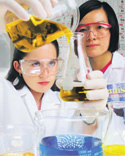
|

|
CHEMISTRY AND BIOCHEMISTRY
Science Building
206-281-2351
www.spu.edu/depts/chemistry
FACULTY:
Kevin Lloyd Bartlett, E. Lawrence Gulberg, Benjamin James McFarland, John K Mouser, Lyle Bernard Peter, Gregory D Phelan, Charlotte W Pratt, Daisy Zhang
Chemistry is primarily concerned with matter, energy, and their
interactions. Chemists do a wide variety of things, including the
following: They make new substances, including new materials and
medicines; they design new ways to make known compounds; they
isolate and determine chemical structures of naturally occurring
substances; they elucidate the chemical bases of biological processes;
they attempt to explain the changes matter undergoes;
develop and apply analytical techniques for criminal investigations
and environmental problems; they sell chemicals, teach chemistry,
and apply chemical knowledge to solve other societal and technological
problems. Chemists are concerned about the effect their
work and technology have on society and on individuals. They are
in the forefront of efforts to make sure that technology serves
humankind rather than vice versa. The curriculum is designed to
serve persons desiring to enter a career in chemistry, biochemistry,
or science education, as well as those interested in pursuing further
study in medicine, dentistry, pharmacy, engineering, and the other
sciences. To qualify for admission to the majoror minor, a student must have
a minimum 2.5 grade point average in SPU chemistry courses.
Requirements for the Chemistry Major
The 2005–06 academic year was the second of a two-year phase-in
of a revised curriculum. Junior and senior continuing students
and advance transfers should consult the 2003–2004 SPU
Undergraduate Catalog.
B.S. in Chemistry
67 credits in chemistry, including 47 upper-division; an additional 15
credits in math and 15 in physics
This course of study is recommended for a professional degree
in chemistry or for those interested in doing graduate and other
advanced work in chemistry, certain aspects of molecular biology,
toxicology, and forensic science. It is guided by recommendations
of the American Chemical Society and should prepare the student
for graduate work in chemistry or for employment as a chemist. In
order to complete this degree in four years, generally a student
should begin with CHM 1211 and MAT 1225 in the first quarter of
the freshman year.Required Chemistry Courses | Required Mathematics and Physics Courses
For students planning graduate studies in chemistry, additional
mathematics (e.g., MAT 2228, MAT 2375, and MAT 2401) may be
recommended by the advisor.
A reading knowledge of German is desirable for those who plan
to do graduate work in chemistry. All students are urged to seek
advising by a member of the chemistry/biochemistry faculty as
early in their programs as possible.
B.A. in Chemistry
52 credits in chemistry, including 32 upper-division; an additional 15
credits in mathematics and 15 credits in physics.
This option is suited for students preparing for medical or dental
school, careers in medical technology, pharmacy or related fields, or
to teach chemistry at the secondary level. Those interested in
careers in medicine, dentistry, or other health related fields should
refer to Pre-Professional Health Programs.
Required Chemistry Courses | Required Mathematics and Physics Courses
B.S. in Biochemistry
67 credits in chemistry and biology, including 49 upper-division in
biology and chemistry; an additional 15 credits in mathematics and
15 credits in physics
The molecular aspects of the life sciences call for an interdisciplinary
course of study in chemistry and biology, plus background
support in physics and mathematics. This degree prepares students
for graduate study in biochemistry and molecular biology. Biochemistry
students interested in health sciences should refer to Pre-Professional Health Programs.
In order to complete this degree in four years, generally a student
should begin with CHM 1211 and MAT 1225 in the first quarter of
the freshman year.
Required Chemistry and Biology Courses | Required Mathematics and Physics Courses
Chemistry Minor
35 credits in chemistry/biochemistry, including 20 upper-division
Must include CHM 1212 General Chemistry II (5 cr.), CHM 3371, 3372
Organic Chemistry (10 cr.). Chemistry courses must include at least two of
these five areas: organic, inorganic, analytical, physical, and
biochemistry. Required Chemistry Minor Courses
Chemical Education. Students preparing for the teaching
profession at the elementary level should take at least CHM 1100
or CHM 1211. (For general science major requirements in elementary
teaching, see the School of Education.)
For junior high level a supporting endorsement provides an appropriate
basis. A supporting endorsement can be obtained by completing
a minor including CHM 1212, CHM 2540, CHM 3371, CHM
3372, and CHM 3225. CHM 3401 and CHM 4361 are also recommended.
See School of Education for a definite description of the
supporting endorsement. Students preparing for a secondary certificate
should complete the requirements for a B.A. in chemistry
including at least two quarters of physical chemistry.
Pre-Professional Health. The B.S. in biochemistry, or the B.S.
or B.A. in chemistry including biochemistry courses, provide preparation
for professional education in medicine, dentistry, and similar
health-related careers. See Pre-Professional Health Programs.
 Print Degree Requirements
| Print this Page
Print Degree Requirements
| Print this Page
|